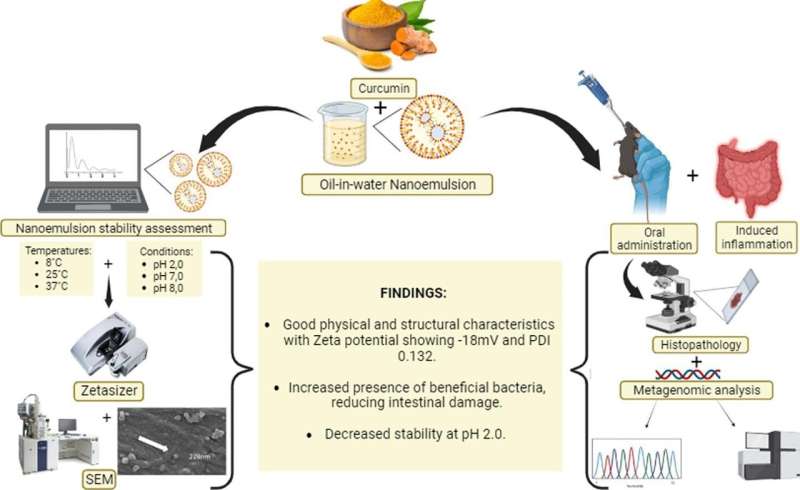This article has been reviewed according to Science X's editorial process and policies. Editors have highlighted the following attributes while ensuring the content's credibility:
fact-checked
trusted source
proofread
Researchers test curcumin nanoemulsion for treatment of intestinal inflammation

A nanoemulsion containing particles of curcumin, which is known to have anti-inflammatory and antioxidant properties, has been found capable of modulating the gut microbiota of mice with intestinal inflammation in experiments conducted by researchers at the University of Western São Paulo (UNOESTE) and São Paulo State University (UNESP) in Brazil.
The study is published in the International Journal of Pharmaceutics.
Curcumin, a natural substance belonging to the group of bioactive compounds called curcuminoids, is a yellow polyphenolic pigment found in the turmeric plant (Curcuma longa). It has gained prominence in treatments to combat inflammatory intestinal disorders, but its bioavailability is low when it is administered orally. This problem is exacerbated in patients with Crohn's disease, ulcerative colitis and other conditions associated with inflammation of the digestive tract and gut microbiota alterations.
To enhance the efficacy of curcumin in such cases, the scientists developed an emulsion containing nanoparticles of the compound (invisible to the naked eye).
"The research comprised two stages. The first entailed producing a nanoemulsion to deliver the curcumin. In the second, we evaluated its stability, morphology and physicochemical properties," said Lizziane Kretli Winkelströter Eller, last author of the article and a professor at UNOESTE.
Next, to test the action of the nanoemulsion in mice, the researchers induced intestinal inflammation using a drug called indomethacin and administered the nanoemulsion orally for 14 days. At the end of this period, they evaluated the intestinal inflammation by macroscopic, histopathological and metagenomic analysis.
The results showed that the nanoemulsion effectively improved the bioavailability of curcumin and modulated the gut microbiota of the mice after the damage was caused by the drug, increasing the presence there of beneficial bacteria.
"The nanoemulsion didn't lead to a significant improvement in the intestinal inflammation, but the relative abundance of Lactobacillus bacteria was about 25% higher in the mice treated with curcumin nanoemulsion than in the control group," Eller said.
The authors of the study, the first to measure the effects of curcumin nanoemulsion in this way, stressed the importance of developing novel formulations that enhance the efficacy of curcumin in preventing and treating inflammatory bowel disease, since it has proved to be a valid alternative to existing treatments, which are expensive and have significant side effects.
The group continues to conduct research on the potential of nanoformulations to deliver nutraceuticals (food elements of plant or animal origin with significant health benefits).
"Specifically with regard to the curcumin nanoemulsion, we're adjusting the formulation to increase the bioavailability of the active ingredient and will soon apply it in other protocols for the prevention and treatment of intestinal damage," Eller said.
More information: Maria Vitória Minzoni de Souza Iacia et al, Evaluation of curcumin nanoemulsion effect to prevent intestinal damage, International Journal of Pharmaceutics (2023). DOI: 10.1016/j.ijpharm.2023.123683
Provided by FAPESP





















